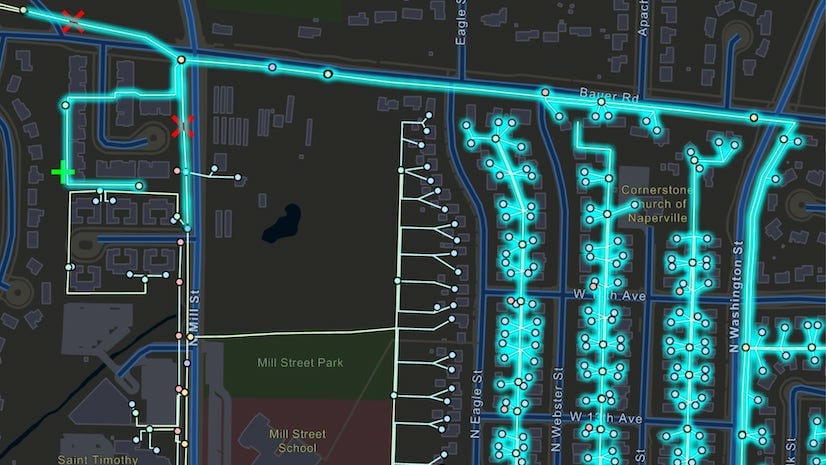Update: ArcGIS Runtime SDKs have been renamed ArcGIS Maps SDKs for Native Apps. Version 200.0 of the ArcGIS Maps SDKs for .NET, Java, and Qt are available for production use. Beta releases of the ArcGIS Maps SDKs for Kotlin and Swift are available on the ArcGIS Developer web site. As a result, the ArcGIS Runtime 200.0 Beta program is closed. See the 200.0 release blog post for more details.
The ArcGIS Runtime 200.0 Beta program is now available for you to get early access to the next major release of the ArcGIS Runtime SDKs for .NET, Java, and Qt. To continue delivering on our mission to bring you comprehensive mapping and geospatial SDKs with a premium developer experience for building modern ArcGIS solutions, the ArcGIS Runtime SDKs are evolving to take advantage of recent developments in the underlying development frameworks on which they are built.
Highlights in this beta release include:
- .NET MAUI support with ArcGIS Runtime SDK for .NET
- JavaFX 17 improved support with ArcGIS Runtime SDK for Java.
- Qt 6 support with ArcGIS Runtime SDK for Qt.
What’s new
ArcGIS Runtime 200.0 builds upon the proven architecture of 100.15 to deliver the same capabilities you’re using today and adds support for the latest developer platforms, frameworks, and tooling.
ArcGIS Runtime SDK for .NET
Version 200.0 of ArcGIS Runtime SDK for .NET adds support for the next generation .NET cross-platform framework .NET MAUI on Android, iOS, macOS (Mac Catalyst), and Windows. To help you get started there are new project templates and v200 branches in the samples repo and Toolkit repo that have been updated for .NET MAUI. Additionally, you can test the new native ARM64 support for.NET Framework and .NET 6 for your WPF and WinUI apps.
ArcGIS Runtime SDK for .NET 200.0 Beta also contains one of the new features planned for the 200.x series with support for real-time data via the Dynamic Entities API. The first data source type supported in ArcGIS Runtime is the ArcGIS Stream Service (provided by ArcGIS Velocity and ArcGIS GeoEvent Server). For info on what’s new, migration tips, sample code, and changes, see the ReadMe on the beta program downloads.
ArcGIS Runtime SDK for Java
Version 200.0 of ArcGIS Runtime SDK for Java brings a significant boost to your developer productivity with support for the Java Platform Module System (JPMS). This brings more reliable dependency configuration, increased security and scalability through stronger encapsulation and modularity, and improved performance. In addition, version 200.0 enhances your dev experience via improved integration with JavaFX 17. You’ll experience this through new JavaFX properties in significant areas of the API and support for the JavaFX Color class. For info on what’s new, how to get started, sample code, and changes see the ReadMe on the beta program downloads.
ArcGIS Runtime SDK for Qt
Version 200.0 of ArcGIS Runtime SDK for Qt provides full support for Qt 6, enabling us to support newer platforms, hardware, rendering APIs, and compilers. These include new language features like QFuture, QPromise, and C++ Property Bindings, compiler upgrades allowing us to support C++17 features, dev productivity improvements for QML, such as simplified versioning, required properties, and improved linting tools, and the CMake build system. With this release, OpenGL remains the rendering API on all platforms but the move to Qt6 is crucial in enabling us to put Direct3D for Windows and Metal for iOS on the roadmap. For info on what’s new, migration tips, how to get started, sample code, and changes see the ReadMe on the beta program downloads.
Get the Beta and share your feedback
Go to the ArcGIS Runtime SDKs 200.0 Beta program to find:
- Detailed release notes for each of the SDKs, software downloads for Qt, and information on accessing Java and .NET via the package managers Maven and NuGet respectively.
- For .NET, a sample app showcasing how to work with the new Dynamic Entity Layer API.
- SDK-specific product forums where you can ask questions about using the new SDK and report any issues you encounter while updating your apps.
Continuity
ArcGIS Runtime version 200.0 continues the same comprehensive capabilities, development patterns, high performance, and stability that you’ve enjoyed through the 100.x generation, with SDKs built for the developer tools and practices that are promoted by vendors and the industry today. With a few rare exceptions, the design of the ArcGIS Runtime API remains the same in terms of the classes, methods, and properties you develop with.
There is no change to licensing or the capabilities available at each license level. If you have 100.x license strings, they will continue to work at 200.x. License levels Lite, Basic, Standard, and Advanced and extension licenses all remain unchanged.
The existing release cadence and product lifecycle will continue. In addition to building on the robust foundation of the 100.x generation, you can continue to plan for a schedule of 3 ArcGIS Runtime releases per year and a 4 year support lifecycle for each release.
Product lifecycle for 100.x
Version 100.15 of the ArcGIS Runtime SDKs was delivered in August 2022 as a Long-Term Support (LTS) release. Unlike every ArcGIS Runtime release before it, 100.15 did not include new functionality. Instead, it focused entirely on bug fixes and updates to the various 3rd party libraries we use. It will be supported for 5 years instead of the usual 4, with 1 additional year of General Availability support. This means 2 years of General Availability support (new environment certification, hotfixes/patches), 1 year of Extended support (hotfixes/patches), and 2 years of Mature support (support resources only, with no hotfixes or patches).
ArcGIS Runtime SDKs for Android and iOS
Later this year we will release another Beta that introduces a new ArcGIS Runtime SDK for Kotlin and a new ArcGIS Runtime SDK for Swift. While these new SDKs will continue to use the same core ArcGIS Runtime, they have been reimagined, and rebuilt, to provide the best support for new language features and patterns introduced with Kotlin and Swift. For both new SDKs, the product name has been de-coupled from the OS on which the apps run and is now aligned with the developer technology you use to build your apps. This adopts the same pattern as the other ArcGIS Runtime SDKs and helps distinguish these SDKs from our cross-platform offerings which you can also use to target Android and iOS.
ArcGIS Runtime SDK for Kotlin
This will be a full reimagining of the ArcGIS Runtime SDK for Android as a Kotlin-first SDK, with out of the box support for features like coroutines, flows, and null safety. ArcGIS Runtime SDK for Kotlin will replace the Java based ArcGIS Runtime SDK for Android and some rewriting of application code will be required.
ArcGIS Runtime SDK for Swift
This will be a full reimagining of the ArcGIS Runtime SDK for iOS as a Swift-first SDK, with out of the box support for features like Swift Concurrency, SwiftUI, structs, protocols, enums with associated values, and native Swift collections. ArcGIS Runtime SDK for Swift will replace the Objective-C based ArcGIS Runtime SDK for iOS and some rewriting of application code will be required.
We look forward to working with you as you transition the many amazing apps you’ve built to these next generation developer tools and frameworks.



Commenting is not enabled for this article.